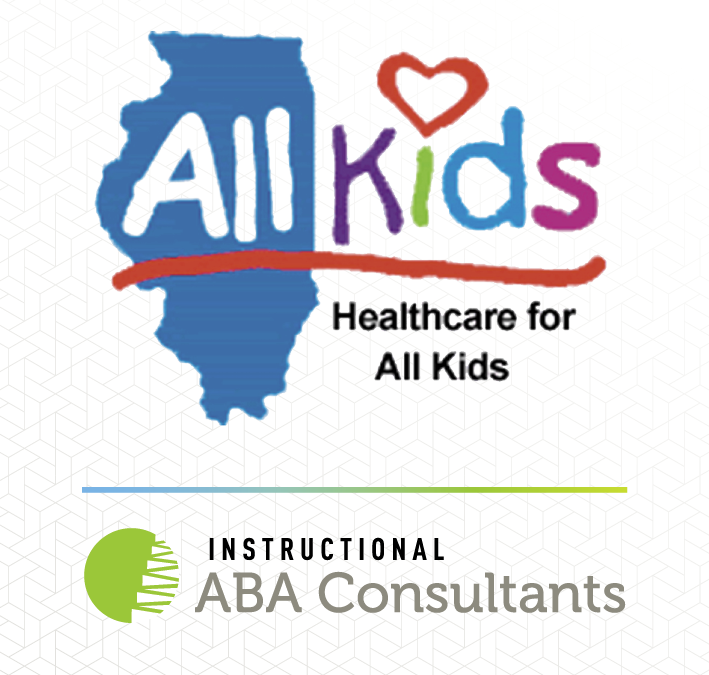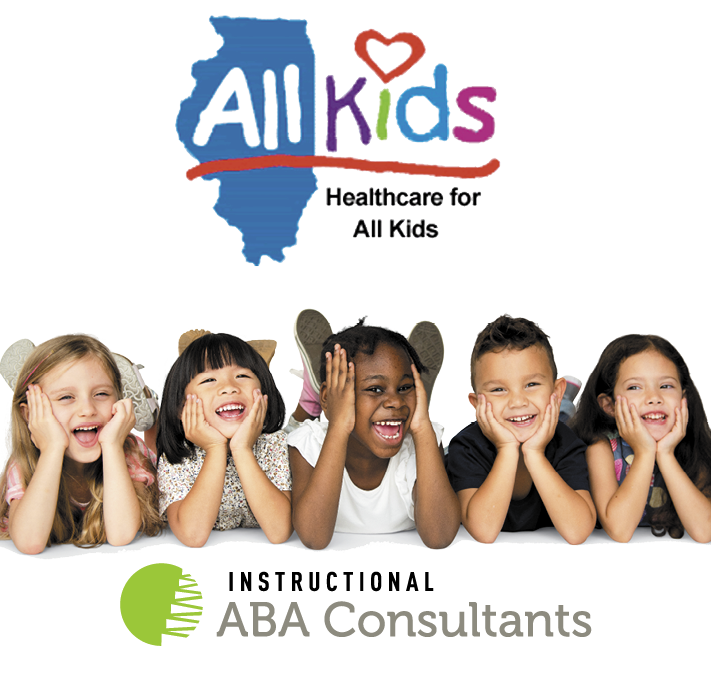
by IABA Team | Feb 12, 2022
ABA therapy only recently became available as a Medicaid-covered health option in October of 2021. ABA therapy and related services are needed more every year, but can be too expensive for many families. Medicaid coverage can alleviate the financial burden and allow families to get the care they need.
What ABA Services & Programs are Covered by Illinois Medicaid?
The state of Illinois only recently (2021 federal EPSDT mandate) recognized ABA therapy as a valid medical service for ASD and other behavioral issues. Illinois Medicaid can cover the following services:
- Behavioral health services
- Licensed clinical psychologists
- Licensed clinical social workers (LCSW)
- Board-certified behavioral analysts
- Registered behavior technicians
- Specialists in any of the above categories
Clinical psychologists and LCSWs can oversee and evaluate behavioral programs conducted by BCBAs or RBTs. Medicaid funding is required that a state-licensed Licensed Professional of the Healing Arts (like a clinical psychologist and LCSW) supervise BCBA treatment plans for individual plans to cover ABA services. The behavioral programs are created based on individual needs and get input from clients, families, and healthcare professionals. All behavior programs must be formally created using behavioral analyst assessments (like the ABLLS/VB-MAPP) and have measurable goals on their behavioral treatment plan as required by Medicaid.
Finding a Provider for Medicaid ABA Therapy
The biggest hurdle for anyone looking to secure Medicaid-covered ABA services is the lack of providers. ABA therapy is allowed to be covered through Medicaid, but ABA services providers don’t have to accept Medicaid.
The best way to find an ABA service provider that accepts Medicaid is to talk to your child’s doctor or psychologist and ask about clinics or services that accept Medicaid. LCSWs are also a great way to find a provider that accepts Medicaid (LCSW services may be covered under your Medicaid plan).
Medicaid Managed Care for ABA Therapy
Be sure to get information about both the Medicaid All Kids and Managed Care before applying. Managed Care programs are not actually handled by Medicaid–they are handled by contracted insurance providers (In Illinois the providers are Blue Cross Blue Shield IL and Meridian).
While All Kids is directly handled by Illinois Medicaid, Managed Care is handled by contracted outside insurance providers who report to the state. Managed Care programs may make different recommendations based on the insurance provider who manages a given plan. This may happen by recommending children to a specific in-network provider for a given service (in-network for BCBS Community or Meridian).
The coverage varies greatly from All Kids to Managed Care programs, so make sure the services your child needs are covered by any Managed Care program you are considering.
ABA Therapy from IABA Consultants
IABA consultants is now accepting All Kids Medicaid! For details and coverage information, find the location closest to you and give us a call or send us an email.
If you have questions regarding autism treatment, education, or plans to use ABA therapy, we are here for you! Our goal is to make sure no family is turned away due to financial constraints. Our therapy team would love to talk to you. Find the location closest to you and give us a call. We’re here for you.

by IABA Team | Feb 5, 2022
What is an LCSW?
A licensed clinical social worker (LCSW) is a state-certified social worker with at least a master’s degree in a social work program. Each LCSW must also pass a national examination. LCSWs have extensive professional training in their field (minimum of 2 years & 3,000 clinically-supervised hours after receiving a master’s) and specialize in mental health.
The mental health aspect of social work is what separates an LCSW from other social workers.
How do LCSWs Help with ABA Therapy?
LCSWs work with clients to secure services from the state they are certified in. This includes securing Medicaid coverage for ABA Therapy and related services. LCSWs work doesn’t stop at securing health coverage, however; they also oversee case & client management and evaluate progress.
LCSWs are able to make recommendations and keep an eye on if their recommendations are working as intended. LCSWs are able to do the following in tandem with ABA therapy and services:
- Case Planning & Management
- Implementing and overseeing ongoing cases
- Evaluations of case progress
- Recommendations based on evaluation results
- Social skills groups to support the social goals of ABA therapy
- Supporting the entire family unit with resources and community outreach
LCSWs talk to both the families of clients and the BCBAs (or other certified behavioral health professionals) to create a clear picture of a client’s needs.
LCSWs & Medicaid
Medicaid plans typically cover both social work and mental health services. An LCSW working with Medicaid is able to secure coverage for ABA therapy services. LCSWs are able to make great recommendations due to their mental health expertise, which includes:
- Mental health treatments & programs
- Clinical supervision of ABA treatment plans
- Family & social functions
- Interpersonal relationships
- Systems–both systems theory and first-hand experience
- Family intakes
- Family education (working with families to understand treatment programs)
- Outreach
ABA Therapy from IABA Consultants
IABA consultants is now accepting All Kids Medicaid!
Medicaid Clinic Timeline:
- Oak Lawn: Current
- Naperville: May 2022
- Glenview: Summer 2022
- Managed Care Plans: Summer 2022
Dates are tentative and may be subject to change.
For details and coverage information, find the location closest to you and give us a call or send us an email.
If you have questions regarding autism treatment, education, or plans to use ABA therapy, we are here for you! Our goal is to make sure no family is turned away due to financial constraints. Our therapy team would love to talk to you. Find the location closest to you and give us a call. We’re here for you.

by IABA Team | Jan 18, 2022
There are many professions that are specifically designated to help individuals with autism. These professions range from publicly available to private in-home programs. The needs of each child are different and so are the professionals that can best help with their development.
Let’s take a look at some of the most common professions in the field of ASD and talk about who can benefit from their services. This is not a comprehensive list and is not meant to be taken as medical advice. Please listen to the recommendations of your developmental pediatrician or doctor!
Autism Professionals
The following 8 professions are commonly used to help with the development of individuals with autism. Note that many of these services can be used together–it all depends on the optimal service plan for each individual.
A note that ABA therapy is still the only evidence-based practice for helping the development of individuals with autism. Other programs and therapies can work in tandem with ABA therapy, but may not show the same results without its inclusion.
Applied Behavior Analysis
Applied behavior analysts (ABA) help individuals with autism learn by using ABA therapy, the only evidence-based method for helping symptoms of autism. ABA therapists are often found in clinical settings but they are able to provide in-home services as well. ABA therapists design unique plans for each individual that work with strengths and weaknesses to ensure progression and development.
Special Education Teacher
Special education teachers are typically found in schools, both private and public. These teachers can be trained in many different areas of special education, including autism. If you are sending a child with ASD to a public school, make sure their special education program includes an instructor who specializes in autism.
Certified applied behavior analysts are known as Board-Certified Behavior Analysts (BCBA). Clinics may use a combination of BCBAs and other ASD service providers in order to provide the best care to clients.
Rehabilitation Therapists
Related to general ABA therapy, rehabilitation therapists specialize in using ABA therapy in a clinical setting to help with development. Rehabilitation therapists are not BCBAs, but are educated and certified to help with ABA therapy in a clinical setting. Rehabilitation therapists without any direct professional links to a licensed ABA therapy practice are not recommended.
Occupational Therapist
Occupational therapists (OT) specialize in helping clients with everyday activities and duties. Like special education teachers, OTs specialize in many areas, from rehabilitation to autism. OTs may be recommended for helping with a development plan or routine for an individual with autism.
Speech Therapists
Speech therapists are essential for helping individuals with ASD and verbal communication issues developing speech and language skills. Like most fields on this list, finding a therapist that specializes in helping individuals with autism is crucial, as there are many types of speech therapists.
Social Workers
Social workers that help families with ASD-related issues typically introduce families to care options, plans, and networks. Individuals with more severe ASD-related issues may need specialized services for their entire life–services that many change over time. Having a social worker to help navigate the care landscape can help families select the best services for their needs.
Finding a social worker who is able to help with all of your child’s needs may take time, as social workers specialize in different areas. If you are thinking about utilizing a social worker, make sure to address all your needs and concerns before starting any program.
Developmental Psychologists, Clinical Psychologists, & Pediatricians
A developmental psychologist focuses on human development over the course of a person’s life. Developmental psychologists can help navigate issues and concerns with a specific individual’s development and recommend plans of action. Developmental psychologists are also able to determine if an undiagnosed case of ASD may be the case of developmental delays.
Clinical Psychologists can serve a similar role as developmental psychologists, but for different ASD-related issues. Clinical psychologists may be able to diagnose cases of ASD and will have information on how to proceed for the best development of an individual with autism.
Pediatricians are the first line of defense for identifying ASD and what to do next. While most pediatricians won’t diagnose ASD, they are aware of what warning signs to look for and what to do if they are encountered.
ABA Therapy from IABA Consultants
This article was intended as an overview of professional services and practices you may encounter with finding a program for an individual with ASD. ABA therapy is the only evidence-based method for improving the development and growth of an individual with autism.
If you have questions regarding autism treatment, education, or plans using ABA therapy, we are here for you! Our goal is to make sure no family is turned away due to financial constraints. Our therapy team would love to talk to you. Find the location closest to you and give us a call. We’re here for you.

by IABA Team | Jan 11, 2022
If you have had a child diagnosed with Autism (or ASD), it can be tough to know what to do next. The developmental pediatrician or clinical psychologist that diagnosed your child may have given you some starting points for your child, but what else should you know?
Let’s take a look at things you should know about before considering certain developmental programs and options for your child.
Diagnostic Levels of Autism
The first thing you should take note of is the level of your child’s symptoms and abilities in regards to the autism spectrum. The Diagnostic and Statistical Manual of Mental Disorders (DSM-5) lists 3 levels of severity for autism spectrum disorder:
- Level 1 – Requiring support. Level 1 is typically defined by inflexible behavior in multiple contexts, difficulty switching from one activity to another, and problems with organization & planning.
- Level 2 – Requiring substantial support. Level 2 is typically defined by difficulty with changes to routines, repetitive behaviors that interfere with everyday activities, and distress or difficulty changing attention or actions.
- Level 3 – Requiring very substantial support. Level 3 is typically defined by extreme difficulty coping with changes, restrictive or repetitive behaviors affecting many aspects of a daily routine, and major difficulties changing attention or actions.
Each diagnostic level of autism requires different plans for proper action to be taken.
ASD Services
There are many services available to help individuals with ASD. Many of these services can work in tandem to create a cohesive plan to help with many aspects of autism. Some of the areas to start looking for help with a new autism diagnosis include:
- ABA Therapy (only evidence-based)
- Speech Therapy
- Occupational Therapy.
- Individualized Education Programs.
Many ASD service providers cover several of these areas and can help point you in the right direction for services they don’t provide. Having a plan with communication between service providers is essential for providing adequate care. If you need to see multiple therapists make sure they share reports with each other–using conflicting therapy methods and tools may not work as intended. Consistency and communication are necessary!
Working with ASD at Home
Aside from professional help, there are many things parents can do at home to help a child with autism learn and develop. These are general good practices to add structure and stability to the home life of a child with autism. Make sure to maintain good communication with any ASD service providers to ensure both you and the professionals are teaching your child the same thing!
Add Structure
Simply scheduling consistent activities on a day-to-day basis can greatly reduce negative reactions to change at home. Getting settled in a scheduled routine is a great way for a child to know what to expect each day. Scheduling can include chores, meal times, bedtime routines, playtime, learning time, errands, and anything else that needs to be done on a regular basis.
Use Visual Aids
Using visual aids can help children with autism learn and digest information more efficiently. Providing imagery for tasks or events can help a child understand what is happening or what they need to do. Using visual aids in tandem with a scheduling calendar is also a great tool that may be easy for a child with ASD to understand.
Learn & Control Sensory Issues
Many individuals with autism have certain sensory issues. These sensory issues can be triggered by any of the 5 senses. Learning what causes certain undesired behaviors or outbursts can help you avoid situations at home. Make sure that the whole family and any guests are aware of any sensory triggers.
Encourage Communication
Children with autism usually have a range of language limitations or delays. Due to their lack of verbal, complex, or social communication children with autism will often engage in problem behaviors to get their needs met. Learning small steps stones of communication with your therapy team and encouraging them with your child will help promote their self-advocacy, decrease tantrums, and increase their communication skills.
Follow through with Demands
Oftentimes, because of limited communication skills, children with autism say, “no!” with their behaviors in big ways. Parents are often, and rightfully, overwhelmed giving into their child’s behaviors because it is how they are communicating. However, as language is being promoted it is important to provide consistent boundaries to decrease tantrums and other harmful behaviors like self-injury.
There are many other things that can be done to help with behavioral issues, but they should be given to you by your child’s ASD service provider(s). Making sure things stay on a consistent schedule and being aware of your child’s needs & triggers can go a long way in smoothing out life at home. It is important to only follow the recommendations of a Board Certified Behavior Analyst when choosing and implementing a behavior intervention plan.
ABA Therapy from IABA Consultants
If you have questions regarding autism treatment, education, or plans using ABA therapy, we are here for you! Our goal is to make sure no family is turned away due to financial constraints. Our therapy team would love to talk to you. Find the location closest to you and give us a call. We’re here for you.

by IABA Team | Dec 21, 2021
ABA Therapy & Medicaid
ABA therapy is not cheap. Thankfully, many insurance companies provide coverage for the cost of the therapy. But what if you don’t have private insurance?
Applied Behavior Analysis is the only empirically-based therapy for children with autism. As research findings validated this, researchers and parent advocates began the hard work of passing legislation that required insurance carriers to cover ABA services for children with autism. In Illinois, in 2008, the Autism Mandate was passed stating children with autism were entitled to ABA therapy and thus insurance must cover this therapy. However, because this was a state law self-funded plans and national plans (like Medicaid) did not have to follow the law. In 2017, Medicaid passed a federal mandate that state plans provide ABA coverage to children with autism. However, because BCBAs hold a national license, not a state license, Illinois Medicaid pushed back.
For the past five years, providers and parent advocates have been working with Illinois law to find a way to get ABA coverage on Medicaid. Finally, in October of 2020, the ABA benefit was awarded on Medicaid insurance for children with autism with the requirement that BCBA’s are supervised by clinicians that also hold state licensure. This means that for over 13 years children with autism and Medicaid funding were largely left without access to the only evidence-based treatment.
While this is great, it can still be very difficult to find a provider who will accept Medicaid for payment due to the lower reimbursement rates of Medicaid insurance and the new supervision requirement of BCBAs..
How Do I Get Medicaid to Cover ABA Therapy & Services?
Your child must be diagnosed with ASD by a certified professional before any steps can be taken. If your child has not been formally diagnosed with ASD, the Medicaid website has resources to get you started.
To get Medicaid coverage on ABA therapy you need to find a service provider who accepts Medicaid. Representatives at Medicaid should be able to give you nearby providers that accept the benefits. You can always call local service providers to see if they accept Medicaid (as their website or database may be missing an update).
As of December 2021, the majority of ABA service providers have not signed up for the Medicaid Program. Make sure to ask any provider you speak to about Medicaid coverage.
What Does Medicaid Cover for ABA Therapy?
Therapy & services provided by an ABA clinic will not differ from Medicaid or private insurance families. ABA providers use the only evidence-based therapy for ASD; the program will be used for all children, Medicaid or not. Programs will be modified based on individual needs.
Medicaid coverage for ABA therapy only covers services provided by Board Certified Behavior Analysts (BCBA) and Registered Behavior Technicians (RBT). Any ABA services provided by or overseen by other professionals will not be covered. Any program covered by Medicaid must be supervised by a licensed clinical psychologist or licensed clinical social worker who will oversee BCBAs and RBTs. All ABA goals must be authorized by Medicaid.
The coverage Medicaid provides for ABA therapy will vary from person to person. Speaking to the billing department at any clinic will help you understand what will be covered on an itemized basis. Medicaid will cover all provider expenses.
More Help With ASD & Medicaid
Recently, many Medicaid programs, both nationally and in-state, have upped the support offered for ASD. ABA therapy was ruled to be included in Medicaid benefits over 5 years ago, but Illinois (and other states) have only recently caught up to Medicaid requirements. Aside from just financial assistance, Medicaid programs are making a concerted effort to have more ASD services widely available.
As Medicaid coverage becomes more comprehensive in regards to provider reimbursement, it will be much easier for families to find the help they need. The program is still young, so the number of providers that accept Medicaid for ABA and other ASD therapies & services should grow quickly over the next few years.
IABA Consultants & Medicaid
Here at IABA, we are working very hard to have everything ready to accept families with Medicaid by March 2022 for Naperville & Oak Lawn and May 2022 for Glenview. We are finishing the enrollment process which will let us bill Medicaid quickly and efficiently.
We have been helping families for almost 10 years now and Medicaid will allow us to help those who might otherwise have no options. We are looking forward to being able to accept any family in need of ASD services regardless of their insurance standing.
Accepting Medicaid strongly supports our mission and core beliefs. Our foundation was built on several principles, one being no child with autism will ever be turned away, regardless of funding source. Being able to accept funding from Medicaid greatly expands our ability to help children from all backgrounds. Every child deserves equal care, no matter their background or funding source.
If you have any questions on getting Medicaid to cover ABA therapy & services, please send us an email. We’d be happy to answer any of your questions or put you in touch with one of our associates who can help meet your needs.





